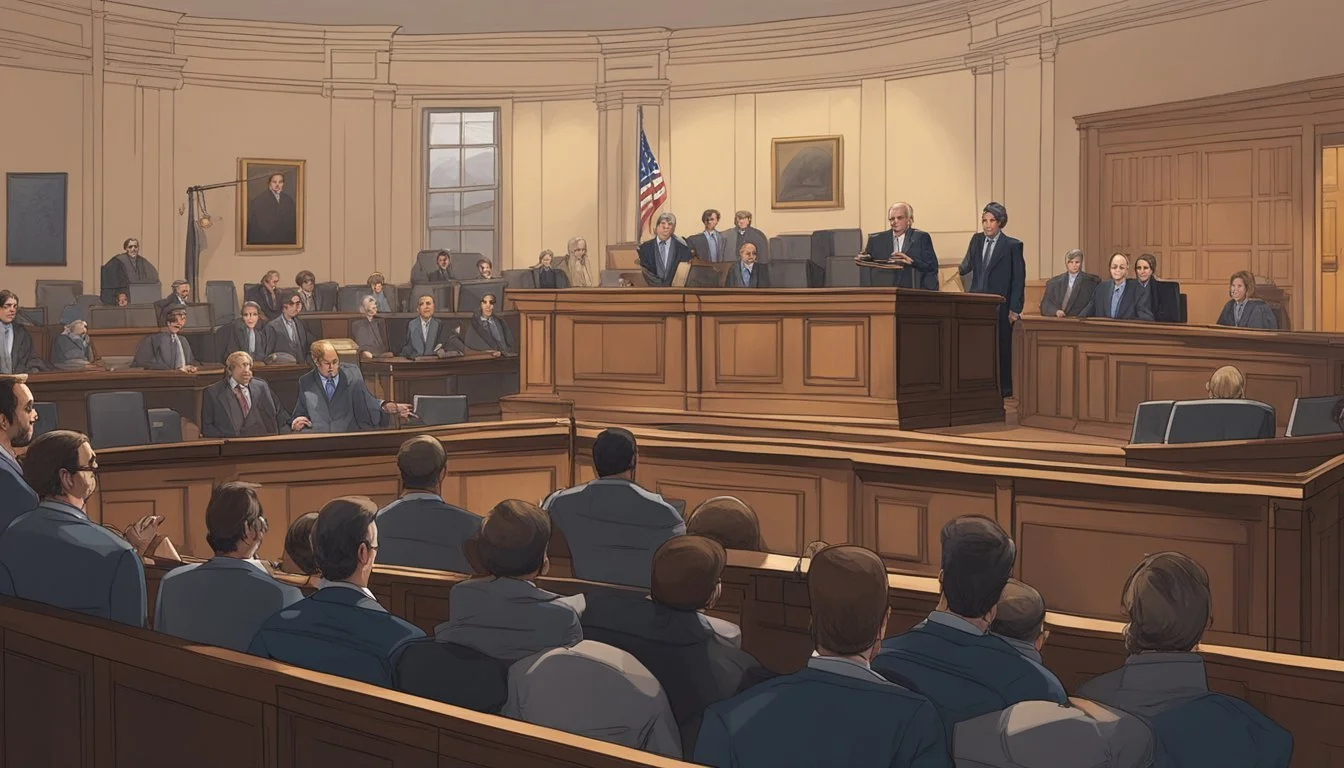Childhood Trauma to Patricide
Examining the Psychological Factors Behind the Menendez Brothers' Crime
The Menendez brothers' case captivated the nation in 1989 when Lyle and Erik Menendez were arrested for the brutal murder of their parents, Jose and Kitty Menendez. This shocking crime brought to light complex issues of family dynamics, abuse, and trauma that continue to fascinate the public decades later.
The Menendez brothers' story highlights the profound impact of childhood trauma on mental health and behavior, raising questions about the intersection of victimization and criminality. Their case challenges simplistic narratives of good and evil, forcing society to confront uncomfortable truths about family secrets and the long-term effects of abuse.
Examining the psychological factors behind this tragic case offers insights into the nature of parricide - the killing of one's parents. By exploring the Menendez brothers' experiences and motivations, we can gain a deeper understanding of how severe childhood trauma can lead to devastating consequences.
The Menendez Family Background
The Menendez family's outward appearance of success masked deep-rooted issues. Their story highlights how childhood experiences and family dynamics can have profound psychological impacts.
Family Dynamics and Early Signs of Abuse
Jose Menendez, a Cuban immigrant, built a successful career as an entertainment executive. He married Kitty Andersen, and they had two sons, Lyle and Erik. The family projected an image of wealth and achievement.
Behind closed doors, a different reality existed. Jose was described as domineering and controlling. He pushed his sons relentlessly, demanding perfection in academics and sports.
Kitty struggled with depression and substance abuse. She was often emotionally distant from her children. The brothers later claimed their father sexually abused them, though this was disputed in court.
Profiles of Erik and Lyle Menendez
Erik, born in 1970, was sensitive and introverted. He excelled in tennis but struggled with anxiety and self-esteem issues. Lyle, born in 1968, was more outgoing and confident. He attended Princeton University before being suspended for plagiarism.
Both brothers showed signs of emotional distress in their youth. They engaged in petty crimes and exhibited behavioral problems. Erik sought therapy for suicidal thoughts.
The brothers shared a close bond, often leaning on each other for support in their turbulent home environment. This relationship would later become central to their defense strategy during the murder trials.
Nature and Impact of Childhood Trauma
Childhood trauma profoundly affects psychological development and can lead to lasting mental health issues. Abuse in early life disrupts normal emotional growth and alters brain function.
Understanding Childhood Sexual Abuse
Childhood sexual abuse involves any sexual activity with a child by an adult or older adolescent. It includes physical contact acts like fondling or penetration, as well as non-contact acts such as exposure or voyeurism.
Sexual abuse often causes intense feelings of shame, guilt, and confusion in victims. Children may struggle to understand or process the abuse, leading to repressed memories or dissociation.
Many survivors experience difficulty with trust and intimacy in future relationships. They may develop unhealthy coping mechanisms like substance abuse or risky sexual behaviors.
Psychological Effects of Emotional Abuse
Emotional abuse involves patterns of behavior that harm a child's emotional well-being and self-esteem. This can include constant criticism, humiliation, neglect, or withholding of affection.
Victims often internalize the negative messages, developing a poor self-image and lack of confidence. They may struggle with emotional regulation and have difficulty identifying or expressing their feelings.
Emotional abuse can lead to attachment issues and problems forming healthy relationships later in life. Survivors frequently battle depression, anxiety, and chronic feelings of worthlessness.
Long-Term Effects on Mental Health
The impact of childhood trauma often persists well into adulthood. Many survivors develop post-traumatic stress disorder (PTSD), experiencing intrusive memories, hypervigilance, and avoidance behaviors.
Trauma increases the risk of anxiety disorders, depression, and personality disorders. Some individuals may turn to self-harm or suicidal behavior to cope with emotional pain.
Childhood abuse is linked to higher rates of substance abuse disorders and eating disorders in adulthood. Survivors may also be more vulnerable to revictimization in future relationships.
Chronology of the Menendez Murders
The Menendez murders shocked Beverly Hills in 1989, followed by a complex legal saga. The events unfolded over several years, from the night of the crime to the brothers' arrests and trials.
The Night of the Crime in Beverly Hills
On August 20, 1989, Jose and Kitty Menendez were shot multiple times in their Beverly Hills mansion. Erik and Lyle Menendez, their sons, claimed they were at a movie theater during the killings. The brothers returned home around 11:47 PM and called 911, reporting they had found their parents dead.
Police initially suspected a mafia hit due to Jose's business dealings. The crime scene was particularly gruesome, with both victims sustaining multiple gunshot wounds from a shotgun.
Immediate Aftermath and Arrests
In the months following the murders, Erik and Lyle Menendez engaged in lavish spending, raising suspicions. They purchased expensive cars, watches, and even a restaurant. This behavior led investigators to scrutinize the brothers more closely.
The breakthrough came when Erik confessed to his psychologist, Dr. Jerome Oziel. Lyle, fearing the confession would be revealed, threatened Oziel. This threat allowed the psychologist to break confidentiality.
On March 8, 1990, police arrested Lyle in Beverly Hills. Erik, who was in Israel, surrendered days later upon returning to Los Angeles. The arrests marked the beginning of a high-profile case that would captivate the nation for years to come.
Legal Proceedings and the Menendez Trial
The Menendez brothers' case involved complex legal proceedings spanning multiple trials. Key factors included the prosecution's pursuit of first-degree murder charges, the defense's abuse allegations, and pivotal witness testimonies.
First Trial and Hung Jury
The initial trial began in 1993, with separate juries for Erik and Lyle Menendez. The brothers' defense team argued they acted in self-defense after years of abuse. This strategy proved partially effective, as both juries deadlocked on the verdict.
Erik's jury split evenly between murder and manslaughter charges. Lyle's jury leaned towards murder convictions but couldn't reach unanimity. The hung juries necessitated a retrial.
Media coverage intensified during this phase, bringing national attention to the case. The trial's controversial aspects, including abuse allegations and family dynamics, became subjects of public debate.
Retrial and Conviction
The retrial commenced in 1995, with significant changes. This time, a single jury heard the case against both brothers. The prosecution focused on premeditation and financial motives.
The defense continued to argue abuse, but faced stricter evidentiary rules. After months of testimony, the jury found Erik and Lyle Menendez guilty of first-degree murder in 1996.
The brothers received sentences of life in prison without the possibility of parole. This verdict marked the end of a lengthy legal battle that had captivated the public for years.
The Role of Witnesses and Evidence
Witness testimony played a crucial role in both trials. Key witnesses included:
Cousin Diane Vander Molen, who testified about alleged abuse
Erik's psychologist, who disclosed Erik's confession
Friends and acquaintances who spoke about the brothers' behavior
Physical evidence was limited but important. Prosecutors presented:
Shotgun shells matching the murder weapon
Receipts for items purchased after the killings
The brothers' lavish spending post-murder
The defense relied heavily on psychological experts to support abuse claims. However, the prosecution challenged these experts' credibility and methodology.
Ultimately, the jury in the retrial found the prosecution's narrative more compelling, leading to the brothers' convictions.
Defense Theories and Prosecution Arguments
The Menendez brothers' case centered on conflicting narratives presented by the defense and prosecution. These competing theories sought to explain the motivations behind the shocking murders of Jose and Kitty Menendez.
Claims of Self-Defense and Fear for Their Lives
The defense argued that Erik and Lyle Menendez acted in self-defense, fearing for their lives due to years of abuse. They claimed the brothers believed their parents would kill them to prevent the alleged abuse from being exposed.
This "imperfect self-defense" theory gained traction in the first trial. Some jurors were convinced, voting for manslaughter instead of murder charges.
The prosecution countered that the brothers' actions showed premeditation, not fear. They pointed to the purchase of shotguns and the brutal nature of the killings as evidence against self-defense claims.
Greed as a Motive
Prosecutors portrayed Erik and Lyle Menendez as cold-blooded killers motivated by greed. They highlighted the brothers' lavish spending after the murders as proof of their true intentions.
The prosecution argued that the Menendez brothers killed their parents to inherit their $14 million estate. They presented evidence of the brothers' expensive purchases, including:
Rolex watches
Luxury cars
A restaurant business
This spending spree, prosecutors claimed, revealed the brothers' callous disregard for their parents' deaths and their eagerness to access the family fortune.
Alleged Sexual Abuse Controversy
The defense's most controversial argument centered on claims of long-term sexual abuse by Jose Menendez against his sons. They asserted that this trauma led to the fatal confrontation.
Erik Menendez testified about years of molestation by his father. The defense argued this abuse created a climate of fear and desperation in the household.
Prosecutors dismissed these allegations as fabrications. They argued the brothers invented abuse claims to justify their crimes and gain sympathy from the jury.
The sexual abuse controversy became a central point of contention. It divided public opinion and influenced jury deliberations in both trials.
Psychological Analysis
The Menendez brothers' case presents a complex interplay of mental health issues, coping mechanisms, and unresolved trauma. Their actions and subsequent trial revealed deep-seated psychological factors that contributed to their shocking crime.
Assessing Mental Disorders in the Menendez Brothers
Erik and Lyle Menendez exhibited signs of several mental disorders. Post-traumatic stress disorder (PTSD) was a key factor, likely stemming from alleged childhood abuse. Their defense team argued that this trauma significantly impacted their mental state.
Antisocial personality traits were also evident in their behavior before and after the murders. The brothers displayed a lack of empathy and remorse, characteristic of this disorder.
Depression and anxiety were reported by both siblings, potentially exacerbated by their family dynamics and alleged abuse.
Coping Strategies and Unresolved Trauma
The Menendez brothers employed maladaptive coping strategies to deal with their unresolved trauma. Avoidance was a primary mechanism, as they rarely discussed their alleged abuse openly.
Substance abuse played a role in their attempts to numb emotional pain. Both brothers reportedly used drugs and alcohol as coping tools.
Their extreme action of patricide can be viewed as a dysfunctional coping response to perceived threats and prolonged trauma. This act represented a catastrophic failure of healthier coping mechanisms.
The brothers' inability to process their trauma through appropriate channels ultimately led to tragic consequences, highlighting the importance of early intervention and proper mental health support for abuse survivors.




